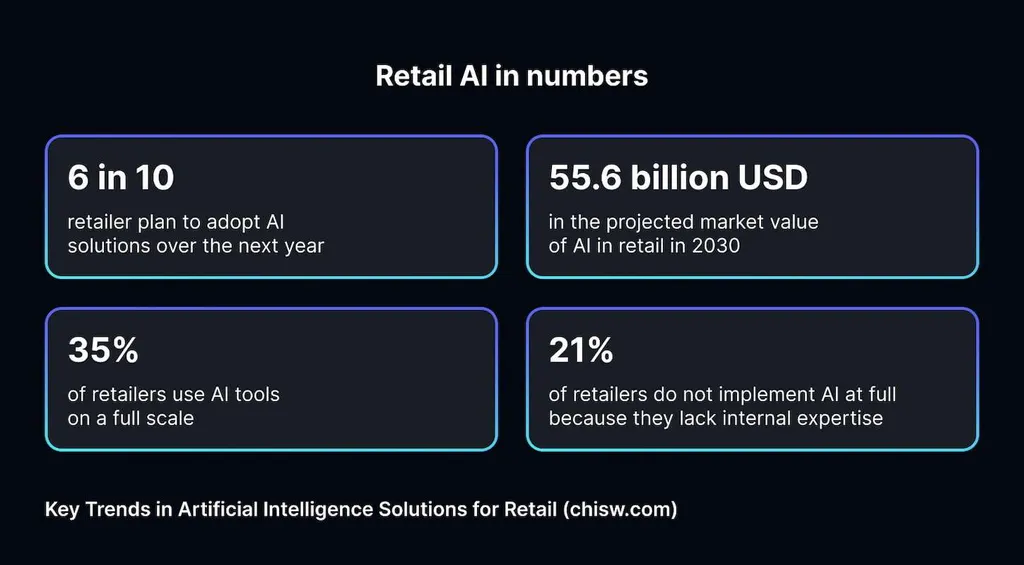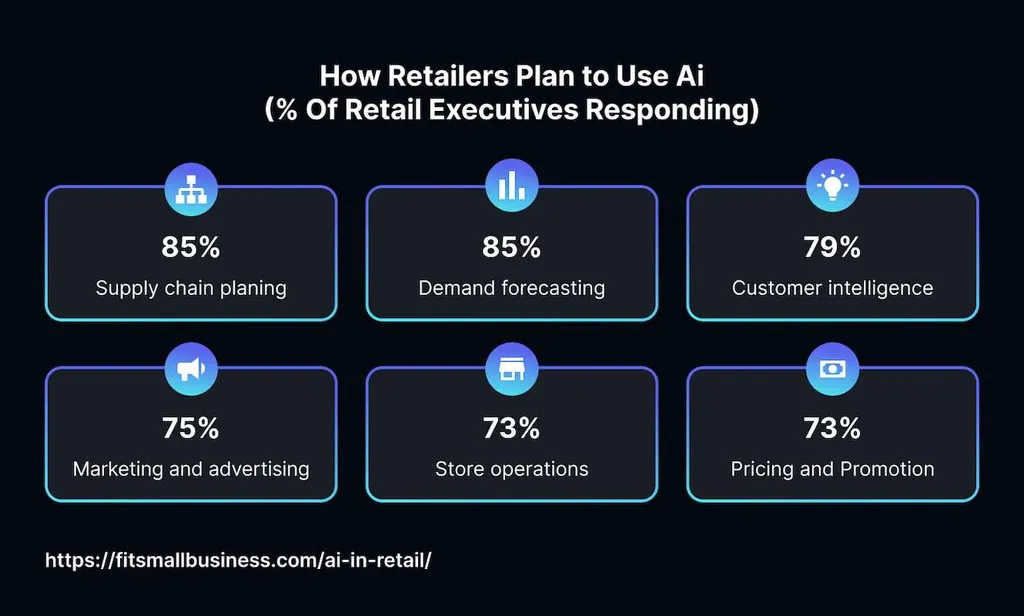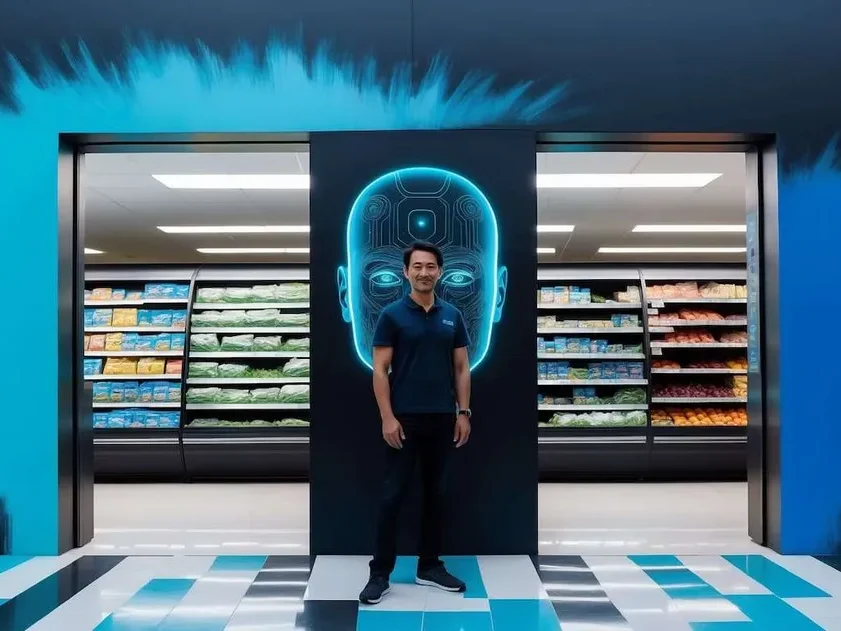As new technologies are shaping world markets and transforming how products are advertised and sold, it becomes crucial for small and medium-sized businesses (SMEs) and large enterprises to adapt to the changing reality. Customers are no longer satisfied with generic recommendations and inaccurate product descriptions. They prefer to avoid being addressed in a robotic voice by customer support (CS) agents and choose to get tailored recommendations. However, detecting the latest tendencies and becoming an early adopter is a laborious task. In this guide, we have reviewed the most impactful AI trends in retail that are bound to change the way companies operate.
Top AI-Driven Transformations in Retail
The increasing adoption of artificial intelligence (AI) technologies has taken commerce industries by storm. The investments in AI increased by 29% in 2023, signifying a pivotal shift in perceptions. Business owners are now convinced that the implementation of AI in retail brings about such tangible benefits as improved customer journey, higher ROI, and new selling opportunities across multiple channels.
Nevertheless, some voices of reason warn that one should not blindly follow AI trends, as it is more important to discover how such tools help firms make marketing efforts more targeted and provide recommendations tailored to the audience’s needs. Below, we have outlined the main retail technology trends that will change the future of the industry.

Virtual try-ons
The impact of 3D and AR technologies on consumer behavior is difficult to underestimate. When blended together with AI, they make it easier to use powerful tools designed to expedite sales of wearables. As static images are no longer sufficient to drive people to purchase a product, the e-commerce industry embraced digital solutions allowing users to see whether a specific item suits them and ensure its perfect fit.
However, leveraging the power of AI and AR allows users to imagine how they would look when wearing clothing, makeup, and accessories. Besides, they can furnish rooms online to see which furniture pieces fit the interior. By enhancing client satisfaction, companies minimize returns and boost profits.
AI-powered search
As many eCommerce platforms have convoluted interfaces, consumers may fail to find a product they need and leave without making a purchase. Unsuccessful search accounts for up to 20% of lost deals resulting in hundreds of billions of losses. This is when AI tools come in handy as they are fine-tuned to recognize a user intent and adjust search results to suit customer’s preferences. Moreover, they analyze buying patterns and make suggestions based on the history of all past purchases.
In addition, enhanced visual search tech makes it easier to discover products with unknown titles. Users can search for images without typing keywords, and AI algorithms will select the most relevant options.
Another improvement is the implementation of voice search technology enabling users to make purchases using voice commands. Due to the abundance of virtual assistants, now clients expect to utilize voice-enabled when visiting a web-based retail store. In the U.S. alone, over 33.2 million people utilize such options to purchase items online without spending much time on shopping.
AI-generated descriptions
SMEs utilize AI-written descriptions fully optimized for SEO purposes to engage their clients and keep information about products up to date. Providing accurate data about key features makes the shopping process more transparent and minimizes the number of returns.
Dynamic pricing
As adjusting price tags manually is an unfeasible option for most firms, AI solutions offer a cost-effective alternative. Most shoppers want to reduce spending and may disregard their loyalty to a particular brand if another company provides generous discounts. Bonuses and promotions help retailers drive more traffic and boost sales.
AI tools adjust prices depending on user feedback, time of the year, consumers’ behavior patterns, and other information. It enables them to develop custom pricing strategies including personalized offers.
Personalized CX
Offering loyalty programs facilitates maintaining a high retention rate and building brand loyalty. Retailers should provide consumers with tailored recommendations and offer rewards to win support. Such strategies allow companies to increase the number of repeat purchases, reduce expenditure, and generate long-term value due to enhanced CX.
Optimized CS
Traditional customer service systems have been fully transformed by AI bots. Integrating them with legacy CS systems in retail is a result-yielding solution. As most clients want to get immediate replies to queries, they prefer to communicate with chatbots as the latter are available 24/7.
Virtual assistants handle complex queries and escalate specific cases to human agents when it becomes necessary. They provide accurate information about products, shipping options, and payment methods, thus contributing to improved customer satisfaction rates. Retail businesses utilize them across multiple communication channels to increase sales.
Top-grade security
As eCommerce businesses lose $48 billion on average per year due to fraudulent transactions, it necessitates introducing powerful solutions capable of protecting consumer data from third-party access. Algorithm-based security measures are one of the most noticeable AI trends in retail. They enable retailers to timely detect any sign of fraud and send notifications to crime prevention teams. Utilizing algorithms trained to recognize suspicious transactions and behaviors facilitates blocking risky operations and ensuring the safety of clientele.
Inventory management
When SMEs scale up operations, they face difficulties trying to meet the increased customer demand. Avoiding overstocking or minimizing the risk of running out of products requires using AI tools to make smarter decisions based on large sets of data. Building AI systems with cameras and sensors facilitates inventory monitoring and enables companies to make their supply chain more efficient.
Due to the large amounts of consumer data available today, retail businesses struggle to process it without using automated solutions. AI allows SMEs and large corporations to employ ML algorithms to get insights from the purchase history, demographic data, and communication with CS agents to provide personalized offerings.
Why Follow AI Trends in Retail?
Trained on large datasets, AI algorithms facilitate processing large amounts of data helping businesses to make informed decisions. Even though integrating such solutions with legacy systems may require significant investments, they have high ROI and bring substantial advantages in the long term.
Using the power of AI, retailers fix security vulnerabilities, enhance CS, improve stock management processes, and create tailored offerings to win the trust of clientele.
Here are the main reasons to integrate AI into retail platforms:
- Maintaining competitive pricing: When prices skyrocket, shoppers start looking for products providing the best value for money. They may be tempted to find a cheaper alternative to a favorite brand because of increased prices. Improving shopping experiences necessitates utilizing AI to select the most appealing prices.
- Forecasting Demand: Analyzing trends requires using automated tools capable of processing large amounts of data. ML technology facilitates making accurate predictions about future market developments and mitigating risks.
- Enhancing Security: A brand’s reputation may significantly suffer due to cyber attacks. When hackers compromise user data, customers lose trust in a firm and start looking for safer alternatives. AI-powered security features timely detect signs of suspicious activities and minimize possible threats.
- Expanding Outreach: Reaching out to a wider audience requires providing foreign customers with content in their native language. AI translation tools allow retailers to generate culturally relevant descriptions and foster strong ties with customers.
- Analyzing Sentiment: Creating tailored offerings requires analyzing customer preferences and detecting early signs of discontent using NLP and ML technologies. Getting an accurate summary of opinions enables companies to deepen their understanding of client needs and pain points.
- Personalizing Catalogs: AI algorithms facilitate adding informative categories metadata to product descriptions to optimize search. Users are pleased when sites remember their browsing history and past preferences and recommend cost-effective alternatives. Custom suggestions improve the perception of a brand and help firms predict sales.
- Optimizing supply chains: Utilizing artificial intelligence in retail allows entities to use neural networks for multiple linear regression (MLR) to select the best supply routes considering traffic and weather conditions, location, and other parameters to reduce costs and speed up delivery.
Regardless of the size of a business, recognizing the emergence of new trends and embracing the latest technological advancements is the right step toward reducing unnecessary expenses and optimizing internal processes.
Examples of AI Trends in Retail

The adoption of AI in retail has been steadily gaining pace. Recognizing the power of personal recommendations, firms embrace digital solutions to boost sales. Following the lead of eCommerce platforms and other businesses that successfully integrated AI tools, companies can gain a competitive edge by streamlining operations. Below, we have described the most illustrative use cases of AI in retail:
- Warby Parker: The company allows its potential clients to try on glasses and sunglasses. By improving user experience (UX), it drives more traffic to its official website. Using a device’s camera and overlay filters, the AI and AR tools create a realistic experience allowing people to see whether specific eyewear frames suit them well. These technologies create a dynamic avatar allowing customers to see themselves as if in a mirror.
- EBay: The integrated ShopBot available through Messenger provides timely replies to queries, recommends products, and sends direct links to streamline the purchasing process. Building automated customer service systems elevates shopping experiences. Buyers enjoy chatting with virtual assistants who are quick to pick up cues and provide top-notch services 24/7.
- H&M: The brand employs the AI-powered Cherry system to generate product descriptions. The tools analyze pictures and leverage NLP to describe them with high precision. The company has decided to add human editors to the loop to ensure the descriptions are accurate.
- Zalando: It employs advanced AI algorithms to analyze users’ browsing habits, items added to Favorites, and purchases they typically make. They enable the company to expedite ML sales by making accurate predictions about a buyer’s preferences and adjusting search results to tailor them to a user’s needs. As the AI in-built dynamic filters are capable of learning, they improve over time when they analyze more user data.
- Starbucks: The brand leverages AI to analyze data about past purchases and study customers’ behavior patterns. Gathering this information allows the company to devise an efficient rewards program and offer exclusive deals to its loyal clients. As people feel that the corporation knows their preferences well, they are more likely to maintain high loyalty to the brand throughout the years.
- PayPal: The Deep Learning Fraud Detection enables the brand to ensure the safety of financial operations by verifying user information. The tool detects users creating multiple accounts and utilizing proxy servers. Due to ML technology, the AI-based system learns from past cases and reduces losses by 25%.
- ASOS: The brand has a native app with the Style Match tool allowing users to take a photo of any item and get personalized recommendations regarding other pieces of clothing to create a harmonious look. Offering a personalized shopping experience, the brand maintains a strong presence on the market.
- Lowe’s: The retailer utilizes AI to manage its inventory and quickly detect gaps on the shelves. After getting notifications, employees restock the supplies to ensure that customers will always be able to order exactly what they need. As the role of AI in eCommerce and other industries continues to grow, it becomes necessary to embrace the solutions aimed at process optimization.
- Amazon: The corporation utilizes an AI-based price optimization tool to change its price tags multiple times per day depending on demand, competitor analysis, sales, and the number of items in stock. The approach helped the platform to boost its profits by 2%.
- Walmart: Due to the integration of the platform with Siri and Google Assistant, users now can add items to shopping lists and purchase products using voice commands. The site analyzes information about previous purchases and facilitates restocking, thus saving a lot of valuable time for its clients. In addition, consumers can choose between different delivery options.
AI solutions allow companies to build customer engagement, achieve an increase in sales due to relevant product recommendations, reach avenue growth goals, and identify possible issues to maintain a high retention rate.
Final Thoughts
Retail digital transformation necessitates employing AI to recognize upcoming trends, launch marketing campaigns tailored to the needs of clientele, provide relevant product recommendations, and launch personalized loyalty programs. Discovering AI trends in retail is the first step toward implementing solutions aimed at improving CS and enhancing all the stages of an ordering process.
Building a sustainable business requires improving the quality of CS, getting actionable insights into user behavior, creating efficient supply and distribution networks, using pro-grade demand forecasting tools, and offering relevant recommendations. Tailored shopping experience is a prerequisite for a successful development of a retail company. Competing with frontrunners is an arduous task unless a firm learns how to integrate AI products into its workflow.
At MetaDialog, we strive to provide our clients with AI solutions tailored to their specific needs. As the cost of integrating AI using in-staff programmers is too high, we offer cost-effective services to assist our clientele through all the steps of a journey toward the adoption of this technology. Book our services and learn how to use the power of AI to your advantage!
